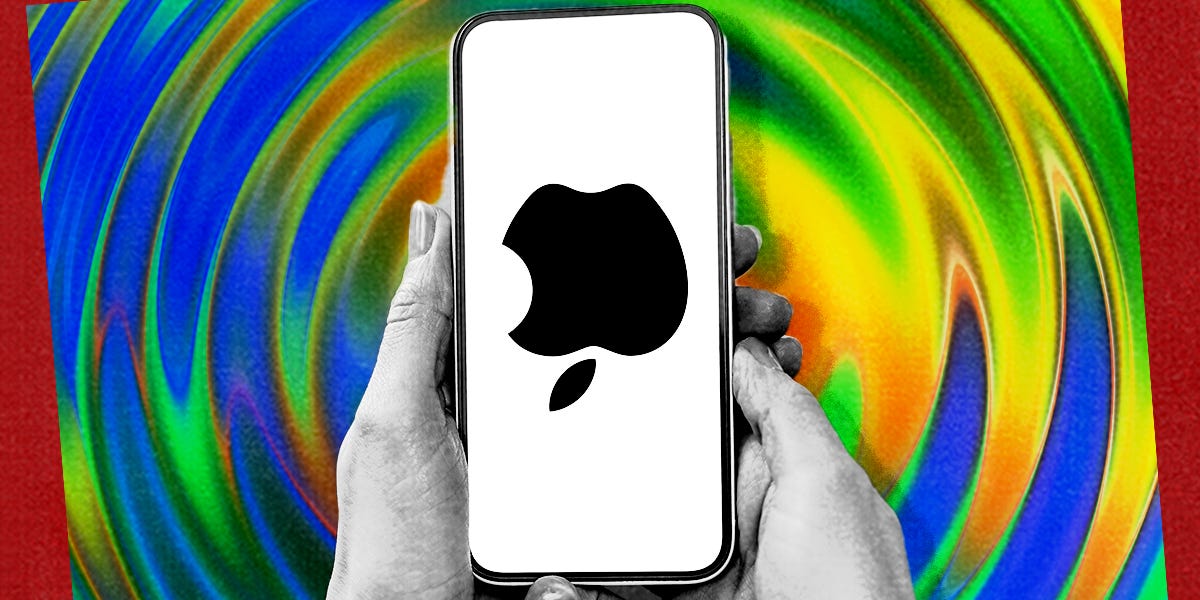- The DOJ filed a lawsuit against Apple, accusing it of illegally maintaining a smartphone monopoly.
- The lawsuit could force Apple to make its ecosystem more accessible to outside companies.
- Some critics of the suit say it could make the iPhone’s security and user experience worse.
The US Department of Justice is trying to get Apple to open up its ecosystem.
But is that something iPhone users really want?
The DOJ filed an antitrust lawsuit against Apple on Thursday. The suit alleges that Apple has illegally created a smartphone monopoly by “delaying, degrading, or outright blocking” technology from other companies.
If the lawsuit is successful, it could force Apple to take steps to make its product more accessible to outside companies. For example, Apple could be required to eliminate green text bubbles from Android phones or allow other wallet options and app stores to exist on its smartphones.
For its part, Apple has argued that the DOJ’s lawsuit could pose any number of issues for iPhone users — including security and privacy concerns and a degradation in user experience.
“This lawsuit threatens who we are and the principles that set Apple products apart in fiercely competitive markets,” Apple said in a statement to Business Insider. “If successful, it would hinder our ability to create the kind of technology people expect from Apple — where hardware, software, and services intersect.”
In other words, Apple is basically saying it would be forced to create an inferior iPhone.
So what could that look like?
It could get easier to accidentally download spyware
If successful, the DOJ’s lawsuit could result in similar changes being made to the iPhone in the US as have been seen under the European Union’s Digital Markets Act, a regulation designed to keep the tech market fair and competitive by inhibiting “gatekeepers.”
Earlier this month, Apple railed against the new EU regulations in a 32-page white paper, saying that allowing other app stores on its device in compliance with the DMA would open iPhone users up to a host of security and privacy issues, including fake apps and scams, spyware, ransomware, and the increased risk of unsavory content such as pornography.
“The new options we’re introducing to comply with the DMA necessarily mean we will not be able to protect users in the same way,” the company wrote, saying some of its users had already reached out regarding concerns about their security in light of the new regulations.
Privacy safeguards could take a hit
Apple has long warned there could be security and privacy concerns to sidestepping its App Store. Apple CEO Tim Cook said in 2022 that competition laws that open the iPhone to other app stores could nullify the company’s efforts to protect user information.
“That means data-hungry companies would be able to avoid our privacy rules and once again track our users against their will,” Cook said at the time.
The venture capitalist and tech analyst Benedict Evans has said there are risks to letting developers have the kind of freedom the DOJ is calling for.
“You seriously want to let any developer do whatever they want to a device that billions of people carry around every day?” Evans wrote on Threads, discussing those in favor of forcing Apple to open up its app ecosystem to third-party app stores and sideloading.
A less-seamless user experience
Some technology experts say the DOJ’s lawsuit could also have a detrimental impact on Apple’s signature user experience.
Jennifer Huddleston, a technology policy research fellow for the libertarian think tank Cato Institute, which was cofounded by Charles Koch and previously voiced support for Apple in a similar legal battle, told Business Insider that she’s already seen complaints from Apple users in light of the EU’s new restrictions on Apple and the DOJ’s lawsuit could have a similar effect in the US.
“At the end of the day, do we want government bureaucrats playing product designer, or do we want innovators and consumers coming up with the best design for consumers?” Huddleston said.
For example, in order to incorporate the new EU policies, Apple added a pop-up menu asking users whether they’d prefer to transition to a rival service. The addition led to criticism from some users who questioned whether Apple intentionally created a poor user interface to detract from users who might select a competitor’s service.
What’s more, Apple has said apps downloaded outside its App Store may not properly integrate with the company’s other services, such as its option to set purchase restrictions for the App Store.
“If you’re among the millions of Americans who have purchased an iPhone because of integrated features like Find My Phone, Apple Pay, iMessage, or integration with Airpods and Apple Watch, you better hope that this lawsuit fails,” Adam Kovacevich, the CEO of the tech-policy group Chamber of Progress, which has received funding from Apple and other Big Tech companies, wrote on X.
Apple users may not want an Android experience
The lawsuit could eliminate some of the differences between Apple’s smartphone and others on the market, Huddleston told BI, pointing out that Apple’s focus on privacy and its simple design are key reasons some consumers prefer the product.
Dave Lee wrote in a Bloomberg column that the Android experience, which he dubbed a “steaming hot mess,” wasn’t for everyone — especially for the “less tech savvy.”
“Would it be better for users, for instance, if their credit cards, plane tickets and IDs were squirreled away in different apps for banks, airlines and everything else?” Lee wrote. “Or would they rather have them, as Apple currently forces, in a single wallet they knew was secure?”
Still, while there may be some benefits to the DOJ’s lawsuit, particularly for developers, the Forrester analyst Dipanjan Chatterjee has said the issue ultimately comes down to whether consumers want the ability to choose for themselves — or simply want to enjoy Apple’s handpicked experience.
Chatterjee told Fortune: “Apple’s obsession with its customer experience leads it to control the experience tightly, make decisions on its customers’ behalf, and maintain an ecosystem that consistently delivers on the experience the brand promises.”
Correction March 25, 2024: An earlier version of this story incorrectly stated the Cato Institute’s origin. It was cofounded by Charles Koch, not both Charles and his brother David Koch.
Read the full article here





